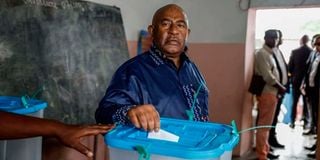Comoros votes as President Azali Assoumani predicts first round win

Incumbent Comoros President and presidential candidate for the Convention for the Renewal of the Comoros party, Azali Assoumani, casts his ballot at the Mitsudje public school polling station in Moroni on January 14, 2024.
Moroni, Comoros
Comorans voted in a presidential election Sunday, with incumbent Azali Assoumani saying he was confident of victory and the opposition claiming electoral fraud.
Several opposition figures on the Indian Ocean archipelago had urged voters to boycott the poll, in which five candidates are standing against 65-year-old Assoumani for the top job.
"There is confidence that I will win the first round. It is God who will decide and the Comoran people," the president said after voting in his hometown of Mitsoudje, just outside the capital Moroni.
"If I win the first round, it will save time and money," he added.
But the opposition candidates denounced "fraud" and "ballot box stuffing" in several localities, after voting got off to a delayed start.
"As in 2019, we are witnessing an electoral fraud by Azali Assoumani with the army's complicity," Mouigni Baraka Said Soilihi told a news conference, alongside the other four opposition candidates.
Assoumani -- who has jailed some critics and sent others into exile -- dismissed reports of irregularities from the opening of the polls, saying he had "not heard about it".
"You need proof," he said, adding that the low turnout was due to bad weather.
The vote count began in the evening after polling stations closed, sometimes by candlelight as in La Coulee, a northern district of Moroni, and under heavy police surveillance, AFP noted.
Rapper Cheikh MC, watching the count there, said he was unimpressed by the proceedings.
"For me, these are not elections. We're witnessing a dangerous game that could explode."
Houmed Msaidie, the president's campaign manager, denied any electoral fraud, accusing the opposition of being "petty and conspiratorial".
Opposition boycott
Full results of Sunday's vote are expected to be published during the week.
Earlier in the rain-drenched capital, several polling stations faced delays and opened after the scheduled 7:00 am (0400 GMT) start.
"The stations often begin late," an African Union observer told AFP.
Assoumani, in power since 2016, extended his time in office through a controversial constitutional referendum in 2018 that removed presidential term limits.
The president's arch-rival and highly popular predecessor, Ahmed Abdallah Sambi, was handed a life sentence in November 2022 on charges of high treason.
Suspicions of election fraud emerged due to the late publication of voting lists, with opposition leaders saying many people were left unsure where they were supposed to vote.
"We are challenging the improper nomination of voting station staffers, who are all supporters of the ruling party," Latuf Abdou of the opposition Juwa Party told AFP.
Juwa's Djaffar El Mansoib said opposition observers had been "prevented from accessing the polling stations in Anjouan", their traditional stronghold.
Security was beefed up for voting day, and some civil society groups said they were deploying observers at voting stations to "protect" the ballot.
We are lucky
Nearly 340,000 people were eligible to vote in the predominantly Muslim nation, which declared independence from France in 1975. According to World Bank figures, 45 percent of the population of roughly 900,000 lives below the poverty line.
Outright protests are rare on the country's three islands, and Assoumani's supporters are hoping for a repeat of the 2019 ballot, when he was elected in the first round with 60 percent of the vote.
If no presidential candidate wins outright, a second round is set for February 25.
"There are countries where people are born and die without seeing an election," said Assnawi Mohamed, a 41-year-old technician. "We are lucky to have elections."
An estimated 300,000 Comorans have immigrated to France but once again they were not allowed to vote in the presidential contest, despite the promises of the authorities.
Remittances from the diaspora totalled over 20 percent of the archipelago's GDP in 2022, according to the World Bank.
Assoumani first came to power in a coup d'etat in 1999, returning to power in 2016 elections. In recent months, he has made a series of promises, pledging better roads and hospitals, for example.





